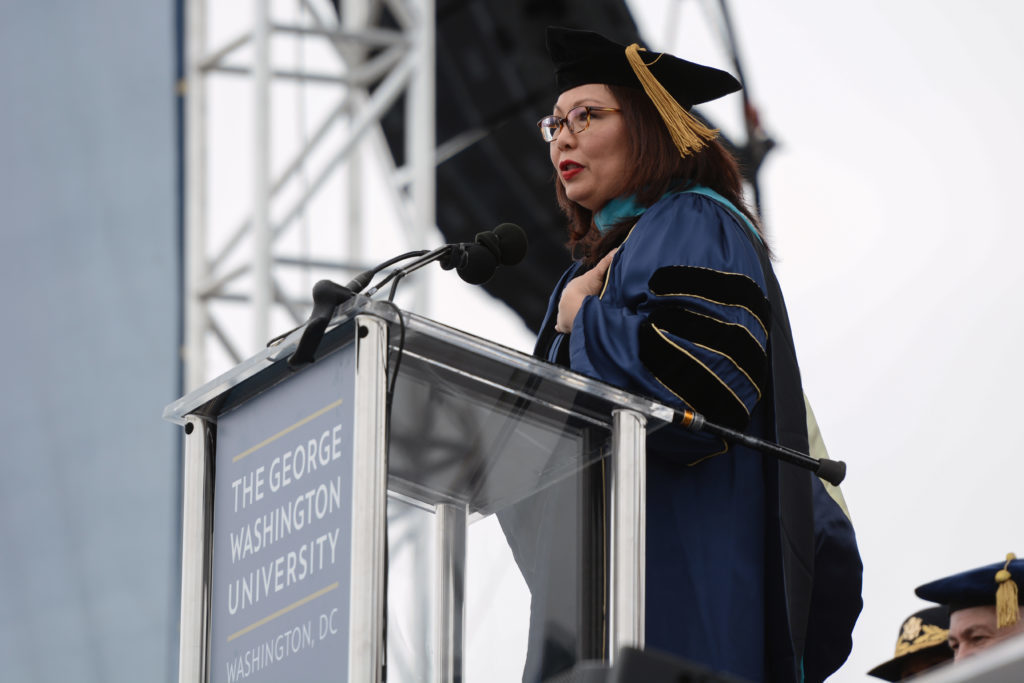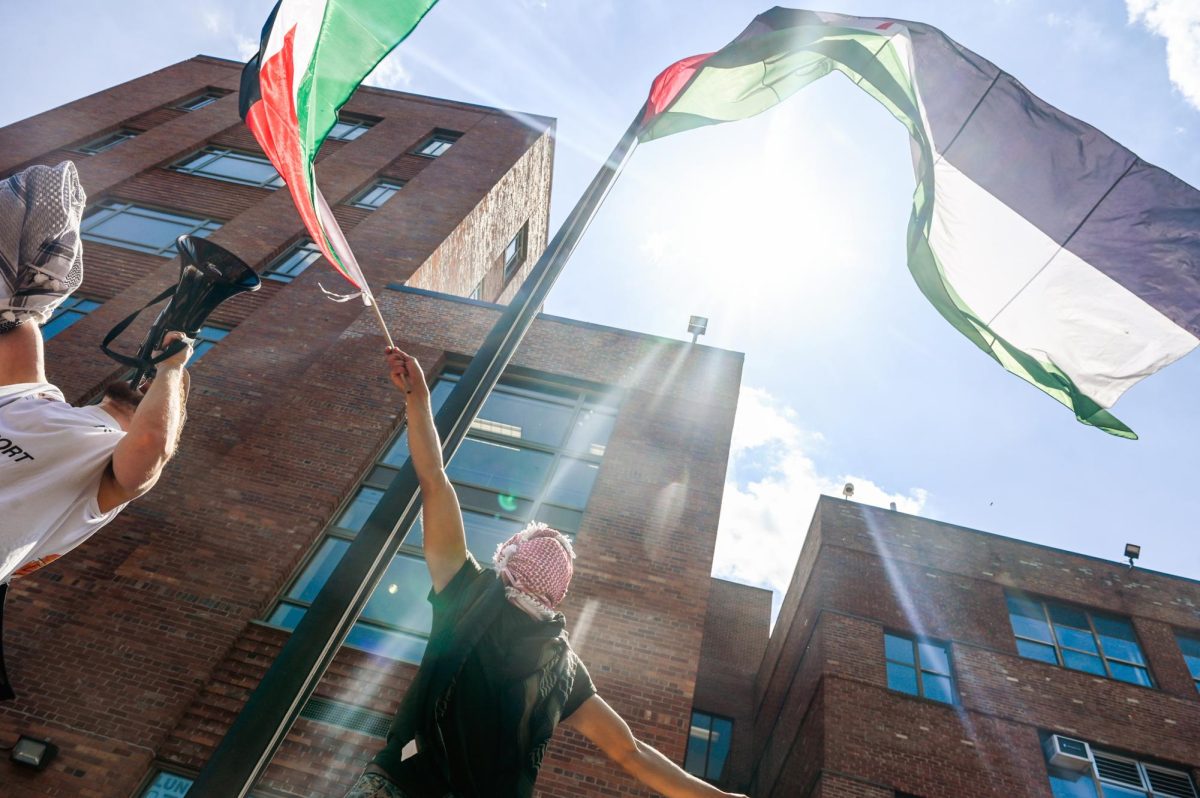Sen. Tammy Duckworth, D-Ill., told graduates that if they wanted to make positive change in society, they had to pick themselves up and get in the arena.
It was a message Duckworth said she has lived by in her own life.
After losing both her legs when her U.S. Army helicopter was shot out of the sky in Iraq in 2004, Duckworth mounted a successful run for Congress in 2012 and for Senate last fall, becoming the second Asian-American woman senator in U.S. history.
Duckworth used her commencement address to the Class of 2017 Sunday to recall her own struggles and told graduates that they shouldn’t fear failure, but instead use it to make themselves stronger. She urged graduates to make their voices heard and pursue their passions in whatever field they enter.
“Don’t be afraid of failure, be afraid of never tasting it,” she said. “Get loud, get active in whatever field you want to get involved in, make a difference in the lives of your neighbors – in your city, in your state, in your country – just like so many other GW students have done.”
She received her bachelor’s degree from the University of Hawaii in political science in 1989 and earned a Master of Arts in International Affairs from GW in 1992.
Duckworth was elected to the U.S. Senate in 2016 after two terms in the House of Representatives, where she was the first Asian-American congresswoman from Illinois and the first disabled female veteran to serve in Congress.
Speaking in the shadow of the Washington Monument, Duckworth told graduates to think of last year’s presidential election as a “catalyst” to get involved in civic service. She said that as the next generation of leaders, graduates should take initiative because “our nation needs you now perhaps more than ever.”
“My message to you, wherever you fall on the political spectrum, is to get involved, not discouraged,” she said.
While pursuing a doctorate degree in political science from Northern Illinois University in 2004, Duckworth enlisted in the U.S. Army and was deployed to Iraq as a helicopter pilot. In November of that year, while on a mission in the skies near Baghdad, a rocket-propelled-grenade struck her helicopter, sending it crashing to the ground.
The attack caused her to lose both of her legs and the function of her right arm. After the incident, she was awarded the Purple Heart and promoted to major.
“My message to you, wherever you fall on the political spectrum, is to get involved, not discouraged.”
In her speech, Duckworth said the days following the attack were some of the hardest she has faced in her life, but that those challenges and failures are not what define one’s character.
“We are not successful in spite of our challenges,” she said. “We are successful because of our will to overcome them.”
She said that pushing through those setbacks only deepened her conviction to keep serving her country.
“One thing has always remained constant, every time I got knocked down I got back up,” Duckworth said. “I dusted myself up, and I got back into the arena when my face had literally been marred with dust and sweat and blood, and I am so glad that I did.”
Duckworth added that while achievements should be celebrated, it is important to remember that privilege and opportunity often lead to success.
“Don’t lose sight of the good fortune and luck that got you here,” she said. Then, quoting rapper Kendrick Lamar, she reminded graduates to “stay humble.”
She said she couldn’t say the rest of the lyric in front of the 25,000 people on the National Mall, but added that learning to rise up from failure will help shape this country’s future leaders.
“Don’t lose sight of the good fortune and luck that got you here.”
“That strength of our nation also comes from a strong diplomatic relationship around the world and a willingness to engage with those who are different from us,” Duckworth said.
The University awarded an honorary degree to Duckworth, along with two other speakers.
Nadja West, the surgeon general of the U.S. Army who spoke at the School of Medicine and Health Sciences medical degree commencement later Sunday said she was “honored” to receive the degree and thanked her parents for instilling a strong work ethic and faith in her. As an orphan, West said she could have just “wandered off the face of the earth unknown” but was instead adopted into a loving family.
“If I can do it with my humble beginning, you can do anything that you put your mind to, and I challenge you to do that for the future,” she said.
Marty Baron, the executive editor of The Washington Post, said that he hopes his honorary degree will help bring recognition to journalists nationwide, especially in an era when the president has been openly hostile to a free press.
“We are doing jobs inspired by the First Amendment, which was drafted by our nation’s founders with this fundamental idea – that the press, and all citizens, should hold government to account,” he said. “We’re not at war, we’re at work.”
Angela Sako, a two-time GW graduate, delivered the student address, recalling the struggles she faced when she moved to the United States from Albania at age 14 and then lost her father soon after.
“All at once, not speaking English, my status as an immigrant, life without my dad – each turned into a brick and built a wall around me, but through the unwavering love of my family and friends, I welcomed the opportunity to transform despair into resilience,” she said. “My family had broken from our wall creating a window with a view to all the beautiful experiences that would soon follow.”
Sako was a Stephen Joel Trachtenberg scholar in 2011, receiving a full-ride scholarship to the University during what she thought was an admissions interview with University President Steven Knapp.
“What I’m hoping is that as our students go out and develop their own careers and explore their own interests.”
After graduating in 2015 with a bachelor of arts in international affairs, Sako was named a presidential administrative fellow, which also allowed her to pursue a master’s degree in public policy for free.
“Such is the power of welcoming: through it, an immigrant girl was given access to a boundless future,” Sako said.
University President Steven Knapp called on graduates to pay attention to big-picture issues in society after they graduate.
“What I’m hoping is that as our students go out and develop their own careers and explore their own interests,” he said in an interview. “They’ll keep in mind the need to pay attention to the larger needs of society.”
Delivering his last charge as University president, Knapp called on the graduates to keep their curiosity alive and to work toward repairing what “earlier generations have broken.”
“I charge for you to nourish the respect you have for all persons, especially those whose cultures, traditions and opinions differ from your own,” Knapp said. “You are our future.”
Andrew Goudsward and Meredith Roaten contributed reporting.





